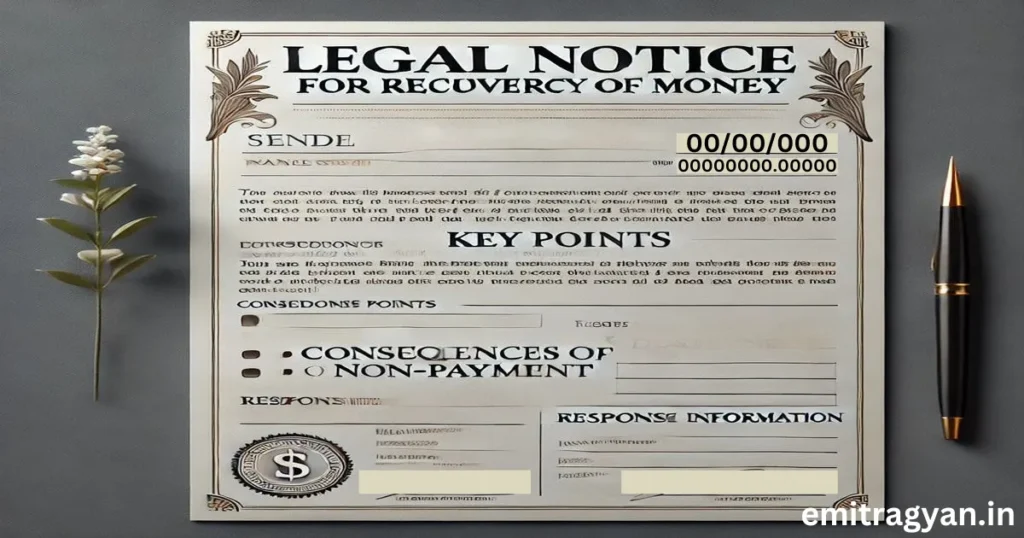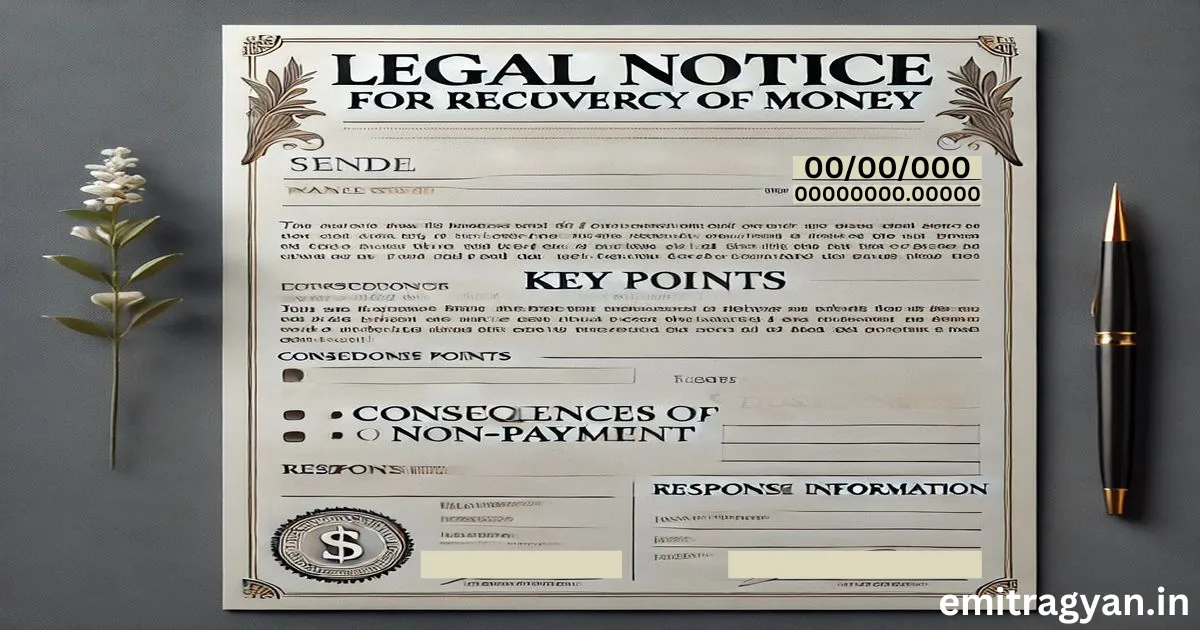In today’s blog, we will explore the process of issuing a Money Recovery Legal Notices – a common requirement in business and trade and finance. Understanding how to issue a Money Recovery Legal Notices is crucial when trying to recover your dues, whether it is unpaid salary, loans or pending payments for services rendered.

In this post, we will understand what a legal notice is, why it is important, and how it can be drafted effectively and correctly. We will read about legal notice for recovery of money in detail today to get a clear understanding of the steps involved in recovering your money through legal notice.
What is a Money Recovery Legal Notices?
A Money Recovery Legal Notices is an official communication sent by one party to another party indicating that a particular obligation may be met if legal action is taken. The notice serves as a formal warning, giving the recipient an opportunity to resolve the issue before any legal proceedings are taken forward. Legal notices can address a variety of concerns, such as unpaid debts, contract breaches and disputes over agreements, providing an opportunity to settle the matter out of court.
Also read :-
The Shocking Truth About Medical Law and Ethics: Are You Really Protected
Everything You Didn’t Know About Court Marriages: Documents, Process & More
Importance of Sending a Legal Notice
Sending a legal notice is usually a legal action and is the first step in initiating legal proceedings. This notice holds significant importance for various reasons:
- Official record: This notice serves as a formal important document clearly outlining the complaint and can be produced or shown as evidence in court if required.
- Opportunity for settlement: This notice gives the recipient an opportunity to resolve the issue in a peaceful manner to avoid legal action.
- Legal liability: According to many legal rules, issuing a legal notice is an important step before taking any matter to court, ensuring that the recipient is informed and given an opportunity to respond.
When to send a legal notice
Legal notices are sent in situations where rights are not fully fulfilled. Some of the common scenarios include:
- Unpaid salary: If an employer fails to pay an employee’s salary on time, the employer is bound to fulfil his financial obligation and a legal notice can be issued to the employer.
- Loan default: When a borrower does not pay a loan, a legal notice is sent by the lender to demand repayment.
- Contractual disputes: When a party breaches a contract, a legal notice can be sent to the other party demanding compliance or compensation for the breach.
Steps to draft a legal notice for recovery of money
Drafting a legal notice form requires careful thought and precision. The following steps should be followed to create an effective notice:
- Use the correct format: The notice form is drafted on the official letterhead of the lawyer or law firm.
- Address the recipient: The recipient must ensure it reaches the right person, with the recipient’s full name and address clearly written at the beginning.
- State the purpose: Begin by specifying that the notice is being sent for recovery of money owed.
- Provide details of the claim: State the amount owed and the reason for payment and reference any relevant dates or agreements. This reference should be clear and precise.
- Set a deadline: The recipient has a reasonable time limit to respond or make the payment, usually 15 to 30 days.
- Explain the consequences: Indicate what will happen if the recipient fails to comply, such as legal action or additional costs the recipient may incur.
- Sign the notice: The notice must be signed by the sender or their legal representative, and include the date of issue for formality.
What happens after sending a legal notice?
After sending a legal notice, the recipient is expected to take it seriously and has the option to respond by making payment or disputing the claim. If the recipient fails to respond or comply within the given time frame, the sender has the right to take legal action, which may include filing a suit in court.
Sample Format – Legal Notice for Recovery of Money
Here is a basic template that can be used to draft a legal notice:
[Your Name]
[Your Address]
[City, State, Pin Code]
[Email Address]
[Phone Number]
[Date]
[Recipient’s Name]
[Recipient’s Address]
[City, State, Pin Code]
Subject: Legal notice issued for recovery of outstanding payments
Dear [Recipient’s Name],
You are informed that the amount of [specify amount] as per our agreement dated [specify date] has not been paid. Despite several reminders, no payment has been received.
You are requested to settle the outstanding amount within [specify time period] from the date of this notice. Failure to do so may result in legal action against you.
Consider this your last chance to resolve the matter amicably.
Regards,
[Your Name]
Common mistakes to avoid while drafting a legal notice
While drafting a legal notice, it is important to avoid the following mistakes:
- Lack of clarity: The amount due and the reasons for the claim must be specified clearly to avoid any confusion.
- Ignoring legal requirements: Make sure all the legal formalities and procedures specific to your jurisdiction have been properly followed.
- Unprofessional tone: Keep the language formal and professional; the notice should not use emotional or threatening words.
Conclusion
Sending a legal notice to recover money is an important step in the debt recovery process. It serves as an official reminder to the debtor and can often result in a settlement without resorting to litigation. Knowing how to draft an effective legal notice can help you save time and resources while protecting your rights. You should consult a legal professional to ensure that your notice is correctly formatted and complies with applicable laws. Mahe Hope you enjoyed this post.
FAQ
Can I Reply to a Legal Notice Without a Lawyer?
Yes, you can respond to a legal notice without legal representation, but it’s important to proceed with caution. Here are some tips:
Seek Legal Advice: While you can respond on your own, it’s beneficial to consult a lawyer for guidance.
Respond Within the Deadline: Make sure to reply within the specified time frame.
Present Your Facts Clearly: Clearly articulate your position and any relevant facts.
Identify All Parties Involved: Make sure to address all relevant parties and positions in your response.
Maintain a Polite and Professional Tone: Keep your response respectful and formal.
Consider Legal Consultation: If the matter is complex, seeking legal advice is advisable.
Express Willingness to Settle: Indicate your openness to resolving the issue amicably.
Gather Evidence: Collect any supporting documentation that may help your case.
Is It Mandatory to Reply to a Legal Notice?
No, responding to a legal notice is not mandatory. However, failing to reply may lead to legal consequences.
Clarification: While there is no legal obligation to respond, ignoring a legal notice could result in the opposing party taking legal action. Additionally, your lack of response might be used against you in court.
Is Notice Period Legal in India?
Yes, notice periods are legal in India, provided they adhere to labor laws and any mutual agreements between employers and employees.

Nice detail blog